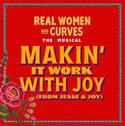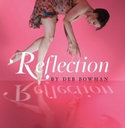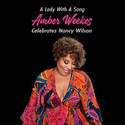|
Here are some female voices to fill our ears and songs to fill our hearts.
 JOY HUERTA JOY HUERTA
MAKIN' IT WORK WITH JOY (FROM JESSE & JOY)
[SONGS FROM REAL WOMEN HAVE CURVES]
Ghostlight Records
4-SONG Digital EP
Recently opening on Broadway is the musical Real Women Have Curves, based on the same-named play and movie. The cast recording from Ghostlight Records won't be available for several more weeks, but, in the meanwhile, the label has released a kind of appetizer that pleases: a digital EP with cover versions of four of the songs. The bright-voiced lead singer is Joy Huerta (who co-wrote the score with her ongoing writing/performing partner, Benjamin Velez). The other participants are cast member Aline Mayagoitia, vocalist Mari Solis, and Nadia DiGiallonardo (who contributed the musical's arrangements and orchestrations, and is the production's musical supervisor). Included is the lively, body-positive title number (the only theatre lyric I can recall having the word "cellulite"–it rhymes with "That's all right"). These give listeners an intriguing first impression of a score that has some positive-energy characters with frustrations, determination, hopes, and dreams.
Musicals frequently give the protagonist(s) songs to express their aspirations, categorized as the "I want" songs, and two check that box here, proclaiming the longing for a better life somewhere, some day ("Flying Away" and "Daydreams"). These are balanced by the practicality and perseverance in "Make It Work" and coming down to earth to face reality checks and challenges. There's a musical pulse and drive that emphasize the sense of being overworked due to dreary deadline pressure to complete a big order in the family textile factory.
Judging ONLY by this sampling, musical style is mixed: a kind of modern but non-rock feel (the story is set in 1987), and there's a brief, playfully sassy excursion into rap toward the end of the title song. Emotions are not vented in an over-the-top way; perspective, a smile, or a shrug seems to be lurking during complaints. But the temperature of the full cast recording may be more intense than what we hear here. And, after all, it's just four preview pieces of a full score. But it's a smart selling point and a certain pleasure to take advantage of the fortunate fact that composer/lyricist Joy Huerta also happens to be a polished, successful vocalist, too.
 DEB BOWMAN DEB BOWMAN
REFLECTION
Mama Bama Records
CD | Digital | Vinyl
If you've never encountered Deb Bowman–Reflection is her fourth album–be prepared for something that might need some getting used to. There are unusual treatments of familiar classics. However, what might at first seem distancing can be disarming. It might take a couple of listens to fully embrace her sound, style, and projected personality. The vocalist/ stage actress who grew up in the South and returned there a few years ago after being based in New York City, is quite different. She is neither your typical powerhouse belter (although she unleashes some big notes) nor the pristine silvery soprano. There's a conversational tone, some crushed-velvet quality and quirkiness, as well as a kind of agelessly cute "little girl" aspect that reminds me a bit of Bernadette Peters or New York cabaret favorite Marissa Mulder. As it is sung with more than a hint of the innocent, dreamy character, Audrey, from Little Shop of Horrors, "Somewhere That's Green" emphasizes those traits. On the other hand, "Send in the Clowns" is quite far afield from its origins; it's not quietly pensive, hurt, or especially restrained and the rhythms shift with some busy instrumentation, Latin flavorings, and a build to a brooding ending.
The yearning and wide-eyed wistfulness wanted for "Moon River" are in splendid supply, including dreamy wordless vocalizing in the middle. As a nod to the brewing cyclone early in the plot of The Wizard of Oz, stormy sound effects and a far-away, fuzzy feel are filtered through the introductory verse of "Over the Rainbow" (here incorrectly listed with "Somewhere" as the first word in the song title, a common mistake). The main part of this classic moves along with liveliness and pluck instead of the usual longing or fervent desire.
With the exception of the Burt Bacharach/ Hal David pop song "This Girl's in Love with You," everything on the set list originated in a stage musical or in a film. There may be only nine tracks, but most are on the longer side. The band members contribute some especially tasty and inventive instrumental passages, although at times these upstage sincere lyrics and moods, opting for tricks, with some overstated moments by musicians or the singer, most flagrantly in "Till There Was You" from The Music Man. Dean Fransen is the pianist and musical director, and the piano/vocal duo on the lullaby "Baby Mine" from the Disney movie Dumbo is a lovely, simple rendition in the "less is more" category.
Upon reflection, Reflection is a unique recording, kind of offbeat and off the beaten path.
 AMBER WEEKES AMBER WEEKES
A LADY WITH A SONG
AMBER WEEKES CELEBRATES NANCY WILSON
Amber Inn Records
CD | Digital
One singer taking the road of recording a tribute to another singer has its pleasures and its pitfalls. That road is usually paid with good intentions, but should be required to post a sign that says "Proceed with Caution." Should an icon's sound and style be channeled, with similar tempi and orchestral arrangements? Or is it best to avoid comparisons by thinking outside the box and "re-imagining" material–to sing in a way that consciously eschews having a whiff of imitation (referred to as "the sincerest form of flattery," but perhaps the most boring form when the recordings of the revered real McCoy are still available). In the case at hand, A Lady with a Song: Amber Weekes Celebrates Nancy Wilson, there's no grand larceny going on, but those us very familiar with the distinctive Wilson ways (she was one of the very first stylists whose dozens of recordings I devoured) can recognize some of the signature approaches and some approximation of the burnished timbre and timing. Especially prominent in the Amber Weekes homage is adopting the role model's habit of slowly unspooling lyrics, parsing them with frequent space between word clusters–pausing, perhaps pointedly, or letting the musicians fill in those many gaps. However, the notable Nancy techniques of choosing some words to deliver with breathy whispers and stretching notes is not much in the plan. Liner notes state that singing along with the old records was something she and her sister did from childhood.
The shadow looms large. But when Amber Weekes is more obviously following the musical blueprints, the results can seem self-consciously effortful rather than organic. Oddly, perhaps, when she traces the trails most diligently, it feels more like tentative tip-toeing and the inevitable comparison makes this well-intentioned entertainer often come across like "Nancy Wilson Lite." It's more difficult to appreciate the gentle, jazzy, pretty voice I enjoyed on previous releases reviewed in this column, but it's otherwise a pleasant listen, with quality songs and skillful musicians, including guitarist Russell Malone and pianist Tony Campodonico; frequent collaborator Mark Cargill, the arranger and producer, has a couple of violin solos.
Of the 13 numbers included, the one most associated with Nancy Wilson is "Guess Who I Saw Today," a staple in the late singer's live performances. The studio version was a track on her first album and was her first single; different live versions were issued on four live sets (two audio, two filmed concerts on DVD). Introduced on the Great White Way in New Faces of 1952, it's one of the few pieces from a Broadway production–all revues. The others are "Gentleman Friend" (Make Mine Manhattan) and "Supper Time," introduced by Ethel Waters for a serious moment in As Thousands Cheer, with musical numbers and vignettes inspired by newspaper headlines. The actual lyric laments "that man of mine ain't comin' home no more," but doesn't spell out that it's about a lynching; however, Amber Weekes employs a spoken monologue that makes it clear. (Unfortunately, the publisher is listed as Berlin Irving Corp. instead of the company named for the writer, correctly Irving Berlin, Inc.)
Nancy Wilson's discography spans the years 1960-2006 (she passed away at the end of 2018), but with the exception of the title song of A Lady with a Song, released in 1990, nothing featured here represents any of the recording star's studio releases beyond 1971. There are plenty of items that are connected far more significantly with other vocalists (the Billie Holiday trademark "What a Little Moonlight Can Do") or are simply standards so many have turned to ("The Best Is Yet to Come," the bossa nova "Wave"). An interesting choice is the tongue-in-cheek saga about women only having "Ten Good Years" to find a spouse. It was written by Luther Henderson and Martin Charnin; the latter (whose name is spelled wrong on the CD, but, yes, it's the same man who'd become most famous for the lyrics of Annie) wrote Nancy Wilson's early nightclub acts.
Is it strange that I suspect that this album might be best enjoyed by those not well acquainted with the more commanding and gutsier Nancy Wilson? Having listened several more times after putting this aside following my first spin of the CD, I am more able to appreciate it on its own merits. Despite my misgivings, I look forward to the next recording by Amber Weekes; I'm always curious to hear what the lady with a song has on tap.
|
|